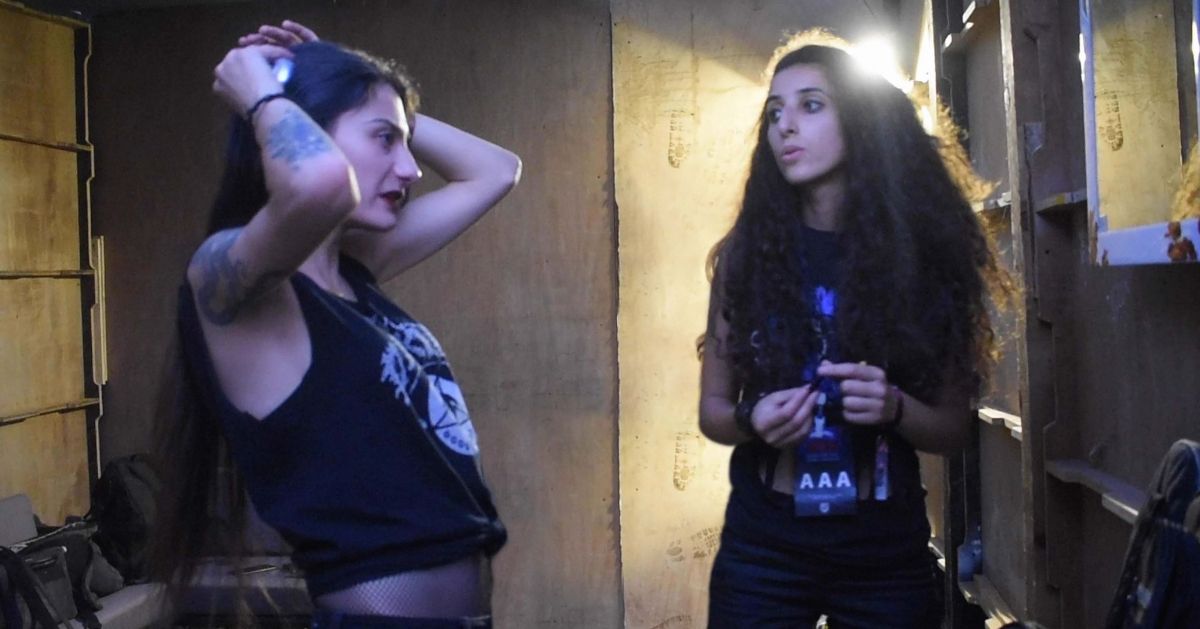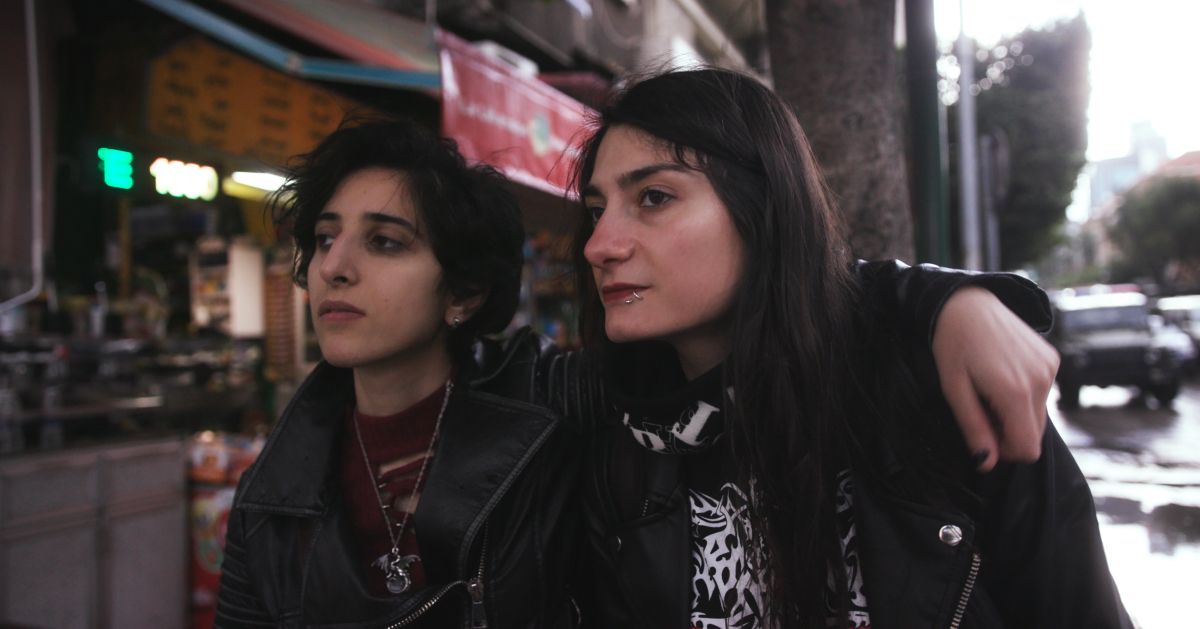There have been several great films and series about women starting a band, from the recent We Are Lady Parts to The Runaways and Ladies and Gentlemen, The Fabulous Stains, but none of them have the high stakes, charm, and poignancy of Sirens, the new film from Rita Baghdadi. That's because Sirens, though a documentary about Lebanon's only all-female metal band, has a sweeping scope that seems to encompass the sexuality of women, political revolutions, the beauty of friendship, and the meaning of music all at once without ever feeling overstuffed.
The band is Slave to Sirens, which at the time was made up of guitarists Lilas Mayassi and Shery Bechara, drummer Tatyana Boughaba, bassist Alma Doumani, and singer Maya Khairallah. The central thrust of the film, though, is on the complicated relationship between Lilas and Shery, people who are more multifaceted and charming than a fictional script could devise. Baghdadi spoke with MovieWeb about her intimate portrait of these women at a very specific moment in time.
Meet Slave to Sirens, Lebanon's Maidens of Metal
"When I first started making the film, the only thing that I knew for certain was that it was about a band trying to make it under extraordinary circumstances," said Baghdadi. "Beyond that, I would leave it up to chance." Baghdadi's approach to documentary filmmaking is always fascinating, providing a humanizing look into the actual people who are swept up in the consequences of major sociopolitical changes. In the great My Country No More, she looked at the communities affected by the oil boom in North Dakota; in City Rising, she explored the effects of gentrification and the economic diasporas across California.
Sirens is her best yet, not just because of her beautiful framing and ability to edit three years of footage into a concise, meaningful narrative, but because of her subjects. Lilas and Shery, in particular, are utterly fascinating — founders of the band, Lilas and Shery have a complicated relationship fueled by mutual admiration, pushing each other to do better, though there are some obvious resentments that have been brewing between them for some time.
The band dynamics between these young women in the midst of personal and political changes are just as compelling as, say, the Metallica members going to therapy in their documentary Some Kind of Monster. Meanwhile, Lebanon was in the midst of massive political revolutions and economic crises. "I had never been to Lebanon before. So when I first got there, I was staying with Lilas, and I sort of got an immediate sense that things were a lot more complicated than just the band trying to make it under extraordinary circumstances."
Rita Baghdadi Sees Herself in Sirens
With her wild curly hair, sly smile, sarcastic energy, and occasionally acidic bitterness, Lilas is a fascinating protagonist of sorts here. "I really gravitated to Lilas because of her complexity as a young woman trying to navigate the world and figure out who she is and her place in it," said Baghdadi. "I loved the fact that all of a sudden, the film became a coming-of-age story in a way, and I leaned into that while I was filming. I really kind of knew that I would focus on Lilas, just because we were so close. At the same time, everything was on the table, so I filmed with all the other young women equally, but Lilas' story really emerged as the one that was unfolding in front of me."
"It was about a year into filming that I knew we could make a film that was a coming-of-age story," continued Baghdadi, "that it wasn't just like a 'rock doc.' And then of course, we had two more years of filming, and then in the edit, it was really a process of eliminating everything that didn't fit into that."
Baghdadi seemed to relate to what these women were going through. "My family's Moroccan, I'm Moroccan-American, and growing up during the Iraq War, around 9/11, these big political events that happened during my own coming-of-age really affected me because of the way Arab people were portrayed in the media, or how people were spoken about, and the Islamophobia. The girls [in Sirens] aren't Muslim, but my family is, and just the negative stereotypes about the MENA region, the Middle East North Africa region, really affected me. I feel like I didn't realize that until I got older and started making my own films. And then I realized I can do something about it. I can change the narrative."
Sirens Changes the Narrative of Arab Women
"Stories have the power to reframe history in a good way or in a bad way. That was a real intention when I started making Sirens, and I think that it was brewing inside me since I was probably 16," said Baghdadi. "I grew up watching, like, Sofia Coppola films, and I wanted to make a film like that, a coming-of-age film."
Making that kind of narrative-changing film about young Arab women, the story "brewing inside" her, seemed to be the perfect next move for the filmmaker. "It was in the intentions all along, but when you make docs, you have to be open to it taking on its own life." Baghdadi didn't realize what sweet and sometimes sad happenstance would lead her to the finished product of Sirens.
"I reached out to the band after listening to their EP, I think it was in June 2018," said Baghdadi. "Then it was in November 2018 that I first went and visited, so that's when principal photography began. I shot for three years basically, and I would go back every few months for several weeks at a time, just depending on what was going on." There was certainly a lot going on — the massive political demonstrations in 2019 through 2020, the tragic Beirut explosion which caused unfathomable damage and killed hundreds, the governmental upheaval and new elections, and an economic collapse leading to roughly 80% of the population falling into the poverty line.
Para One Scores Sirens
For Baghdadi, who so often prioritizes people in the face of politics, Slaves to Sirens remained in the foreground. Her film follows them as they work on an album, book a gig at Glastonbury, shoot music videos, bicker, write songs, break up, and grow up. Yes, it has the makings of a "rock doc," as Baghdadi said, but Sirens is more than a music documentary for metalheads. This is signified by the fact that the score isn't metal at all — it's a synth-laden, gorgeous wash of electronic textures from Para One, who has also provided powerful music for Girlhood and Portrait of a Lady on Fire.
"I always knew their music was going to be a big part of the film, but early on I had this idea that, what if their music was all sort of diegetic," explained Baghdadi, "all happening in real time, all 'live?' Because what I was witnessing was the unfolding of the creative process of songwriting. It wasn't about the finished product. You know, the album is not out yet, so I was witnessing them making it."
Para One creates a wonderful compliment to Sirens. "I just fell in love with his music, and I thought the sound was the perfect balance to the girls' personalities. You know, you have this thrashing, screaming, cursing, angry side that's loud and in-your-face, but they're also just young women who have a much softer side, who are emotional, and who have dreams and hopes. So I wanted Para's music to be the juxtaposition of that, so that we would have a nice balance in the film of both sides of their lives."
The personal and the political, the soft and the hard, the sad and the beautiful — all are present in Baghdadi's great new film. Executive produced by Natasha Lyonne and Maya Rudolph, and from Animal Pictures, Lady & Bird, Endless Eye Production, and XTR, the Sundance documentary Sirens is now in theaters from Oscilloscope Laboratories.





